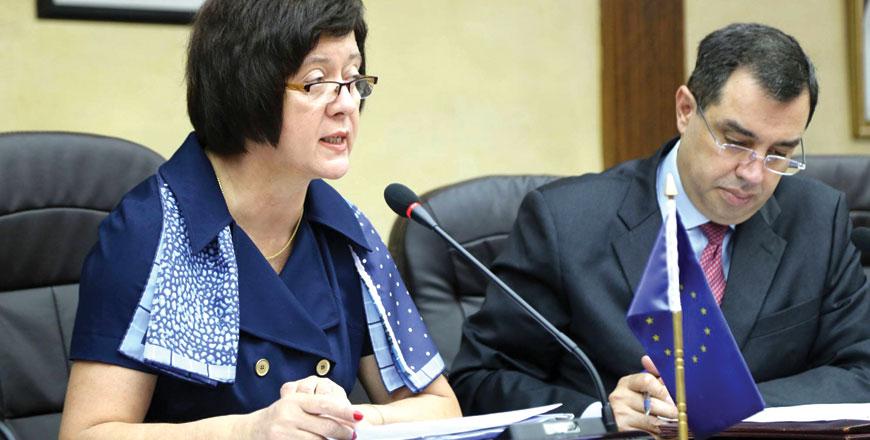You are here
Virtual Exchange programme connects Jordanians to Europe’s learners
By Camille Dupire - Jun 25,2018 - Last updated at Jun 25,2018
AMMAN — A Virtual Exchange programme is providing youth living in Jordan a chance to engage in an innovative intercultural learning experience with their peers in Europe and across the southern Mediterranean.
Part of the Erasmus+ programme, Erasmus+ Virtual Exchange (VE) aims to improve the skills of at least 25,000 young people through digital learning tools over the next two years, according to an official from the European Union delegation in Jordan, one of the partners in the project.
"The general objective of the Erasmus+ Virtual Exchange initiative is to link young people, aged 18-30, youth workers, youth organisations, students, and academics from Europe and the South Mediterranean through online learning activities to strengthen people-to-people contacts and intercultural dialogue," the Erasmus+ website said, noting that the programme will include participants from over 30 European countries, and the southern Mediterranean countries of Algeria, Egypt, Israel, Jordan, Lebanon, Libya, Morocco, Palestine, Syria and Tunisia.
"This programme is a way to strengthen the youth dimension of the EU neighbouring policy with Southern Mediterranean countries, which is at the core of the union's vision," the EU official told The Jordan Times, stressing that "90 per cent of future jobs need digital literacy. Yet, 44 per cent of Europeans lack basic digital skills, with even higher numbers recorded in the southern Mediterranean".
Set up at the beginning of 2018, Erasmus+ Virtual Exchange has trained a number of facilitator third parties who help a group have a "constructive, respectful and authentic dialogue on various topics of mutual interest", before starting its first online dialogues and interactive open online courses in March 2018.
As well as providing a platform for intercultural dialogue and cross-border discussions on a variety of subjects, the VE programme will also implement a transnational exchange project as of August, which aims to teach youth workers and university educators how to enrich and expand their existing programmes.
"In addition to encouraging and increasing tolerance through youth-friendly technologies, the project also seeks to enhance critical thinking and media literacy, particularly in the use of the Internet and social media, to develop resistance to discrimination and indoctrination," an Erasmus+ statement said, highlighting the importance of bringing youth from different backgrounds together to help them develop their parliamentary debate skills.
Developed over the past 30 years from experience in the field of educational exchange, VE has been integrated at all levels of education from kindergarten through university and distinguishes itself in its use of new media platforms to enable deep, interactive social learning, according to web sources.
VE distinguishes itself from other forms of online learning by putting the emphasis not only on academic skills but also on soft skills which are often not formally recognised, such as the development of intercultural awareness, digital literacy, group work, etc.
Financed by the EU and established under a contract with the Education, Audiovisual and Culture Executive Agency, the flagship programme is implemented by a consortium composed of Search for Common Ground, Anna Lindh Foundation, UNIMED, Sharing Perspectives Foundation, Soliya, UNICollaboration, Kiron Open Higher Education, and Migration Matters, an Erasmus+ statement said.
Related Articles
AMMAN — The National Erasmus Plus Office organised a virtual week for Higher Education Reform Experts on June 7-9.During the meeting attende
AMMAN — UNICEF’s Learning Passport, a global digital learning platform that aims to help youth affected by COVID-19 to continue their learni
AMMAN — The EU on Monday signed two financing agreements with the government under which grants worth 55 million euros and 5.5 million euros
















